Torquay United: National League play-off finalists look to end turbulent recent history
- Published
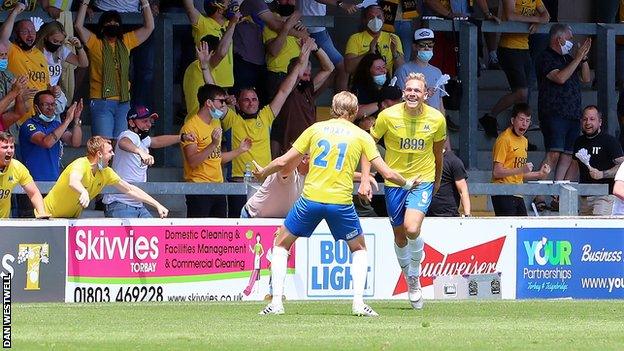
Torquay United are 90 minutes away from a return to the English Football League after seven years
"It always seems to be ups and downs, and hopefully this one will end in the ultimate up."
Torquay United supporter Paul Mulhern and thousands of others are getting ready for one of the club's biggest games in years.
In the past 18 seasons Torquay have not been involved in drama at either the top or the bottom of their respective division just three times.
And on Sunday they will again put their fans through the emotional mixer as they face Hartlepool United for a place in the English Football League.
But the rollercoaster has not just been on the pitch, but off it as well, as a side once a regular in the lower reaches of the EFL aims for a return after seven long years in non-league football.
'I won't be happy until I see them back in the league'
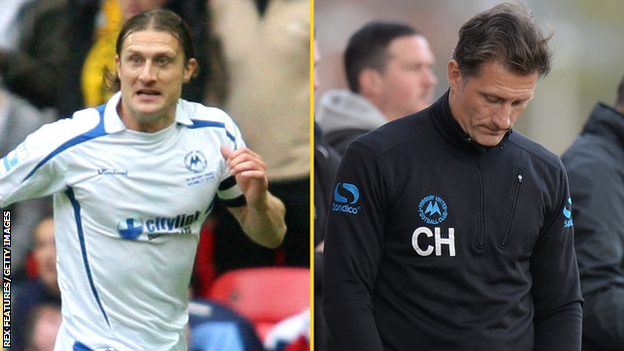
The joy of Chris Hargreaves the player after scoring for Torquay at Wembley and the despair as manager of the Gulls as the club were relegated
Mention Torquay United over the past 15 years or so and one of the first names that will crop up will be Chris Hargreaves.
Now Bristol Rovers academy manager and a BT Sport National League pundit, Hargreaves has known the good and the bad at Plainmoor.
The midfielder captained the Gulls when they last reached the National League promotion final - scoring their opener in a 2-0 win over Cambridge United in 2009,, external having dramatically lost to Devon rivals Exeter City in the play-off semi-finals 12 months earlier.
"I know on the day of the game a few of the younger lads were thinking 'what do you think' and I said 'it's our day, don't even worry about it' - that was the mindset," Hargreaves recalls of his side's Wembley win 12 years ago.
"For whatever reason, whether it was lads getting contracts or paying mortgages, we had to win. I know it sounds a bit melodramatic, but it was the truth, there was no other option really."
That side, backed by money from lottery-winning supporter Paul Bristow, saw the Gulls fly despite his death from a suspected heart attack in 2010.
Having won promotion to League Two, they made the play-offs in 2011 and 2012 - losing to Stevenage at Old Trafford in the final before being knocked out by Cheltenham Town in the semi-finals a year later.
But when Hargreaves returned in January 2014 after Torquay had sacked Alan Knill, he found the money had dried up, and despite his best efforts could not keep them in League Two.
"I want them to go up for one reason, so that relegation is done," he told BBC Sport.
"I wouldn't be happy until I saw them back in the league, and so those massively different emotions of captaining a team at the steps of Wembley and managing a team that gets relegated are incredible highs and lows of football."
'No-one wanted to take over the club'
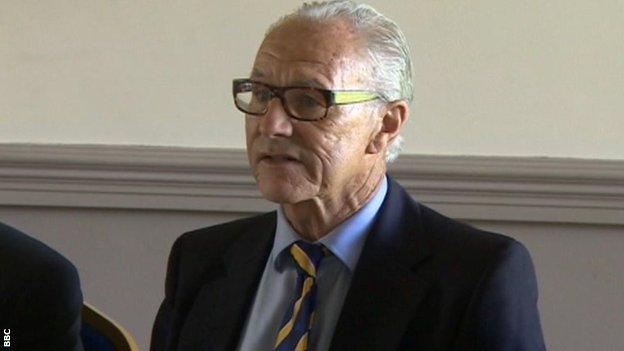
David Phillips became Torquay United chairman in June 2015
Hargreaves' only full season in charge at Plainmoor saw Torquay finish 13th in the National League - a rare mid-table season for Gulls supporters.
That summer he left the club after Bristow's widow Thea ended her association with the Gulls, and more importantly the financial backing that went with it.
"No-one wanted to take over the club," recalls David Phillips, who became the new chairman.
"Steve Breed, a great fan of Torquay, decided to try and get a consortium together, and originally it was supposed to be 10 of us putting in £30,000 each.
"But the 10 turned out in the end to be four. They were probably using their heads rather than their hearts, while the four of us were using our hearts rather than our heads.
"We had an uphill battle all the way struggling for money, so the the £30,000 turned into a lot more than that eventually."
With the financial constraints the Gulls managed to survive in the National League - their 'Great Escape' season saw the Gulls overturn a 12-point deficit to survive relegation in by three points in 2015 and they won four of their final seven games a year later to again finish three points above the drop.
But off the field finances were getting worse - "people were saying to me 'you look ill'," Phillips recalls.
"It came to the crunch day where we either had to go into administration - and I was very proud of the fact that Torquay United had never been in administration - or sell the club.
"I've got to walk through the town of Torquay and I didn't want fingers pointed at me, so the alternative was to let Clarke Osborne and his company take over, they'd already put in some funds to keep us going, and so there we are."
Osborne takes over at Plainmoor
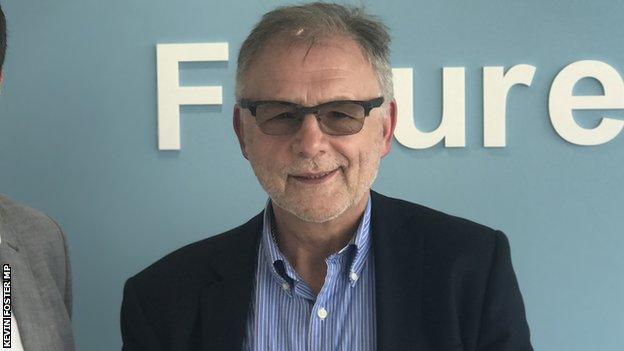
Clarke Osborne has put in more than £3m into Torquay United since taking over in late 2016
So shortly before Christmas in 2016 Phillips and his group of well-intentioned, but ultimately under-funded co-investors sold the club to current chairman Clarke Osborne's firm Gaming International.
Osborne's takeover did not sit well with many at the club - he promised a new stadium but wanted to buy the freehold of Plainmoor leading many to worry about his intentions.
He has rarely given interviews - Torquay United said he was unavailable when approached to contribute to this piece - while the local MP told BBC Sport in 2018 that he finally agreed to meet him after the "implied threat that I would discuss his refusal to meet with me under parliamentary privilege".
"I must have interviewed about 10 prospective buyers, and they were basically all time-wasters," says Phillips.
"Then Gaming International became interested. I came in for an awful lot of criticism, some of it I can see where the fans were coming from, but we are where we are now and we've got to be very grateful to Clarke Osborne and his company because they have put in substantial amounts.
The club's latest accounts - which go up to March 2020 - show Osborne and his companies have put in more than £3m into the club and that figure will have substantially risen since with crowds not attending matches due to Covid-19.
Gary Johnson's yellow revolution
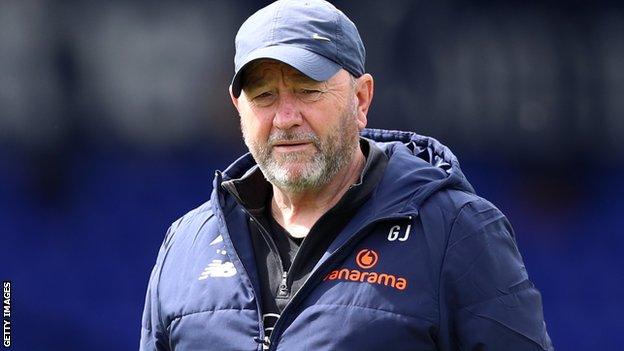
Gary Johnson has brought Torquay's best period of success for a decade
Osborne's tenure at Torquay got off to a tough start.
After surviving relegation in 2016 Osborne sacked club legend Kevin Nicholson as manager after just four games and replaced him with former Bath City boss and Plymouth Argyle coach Gary Owers.
Under Owers the Gulls struggled and that season ended in relegation to the sixth tier of English football - National League South - for the first time in club history.
Owers stayed on but three wins in their first nine games for fully-professional Torquay in the largely semi-professional sixth tier was enough and Osborne acted quickly, bringing in former Bristol City, Yeovil Town and Cheltenham Town boss Gary Johnson.
"I personally think the day Gary Johnson came through the door at Torquay the whole mentality of the club changed, especially on the terraces. All of a sudden people started realising that this club was being serious again," says Mulhern, who also commentates on the club.
"His success rate at this level is astounding. It was only five seasons ago that he took Cheltenham straight back up to the Football League."
Johnson's impact was instant - a club-record run of 10 successive wins helped the Gulls cruise to the title and promotion back to the fifth tier.
Torquay were 14th last season before the league was called off due to Covid-19, but this season they have again been flying.
But for an injury-stricken run of two wins from 11 games at the turn of this year we may well be talking about the National League champions - in the end they finished four points behind winners Sutton United after drawing their last four games of the season.
The Gulls beat Notts County in the play-off semi-finals last week, with Johnson agreeing a new contract to stay at the Devon club.
"To me that was the biggest news of the week, never mind getting to the final," says Mulhern.
"Not just because I want Gary Johnson to be the manager, because it looks like Clarke Osborne is going to continue funding the club.
"I think that's absolutely monumental news for Torquay, because if it doesn't go well on Sunday I know there were a few fans that were really concerned that Clarke Osborne would go 'that was my five years, we've not managed to achieve what I wanted to do, I'm out of here'.
"So even if it is still National League next season it looks like we're going to take it seriously, which I think is the best news Torquay have had in a long, long time."